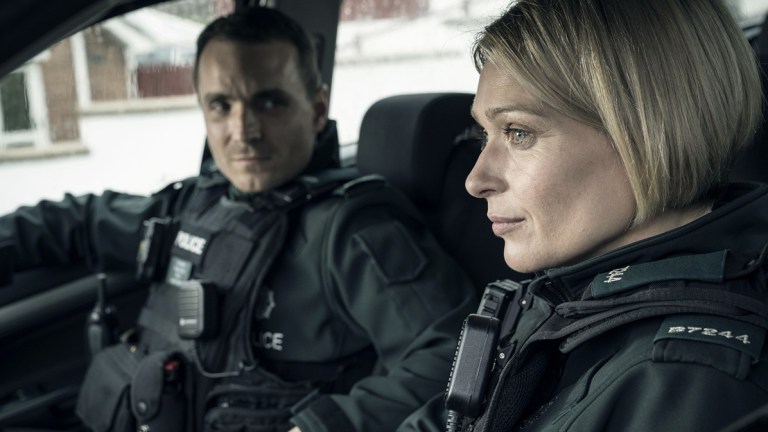How Stevie’s Flapjacks Made Blue Lights the UK’s Most Beloved Crime Drama
Audiences crave warmth.

When Blue Lights debuted on BBC One last year, it was favourably compared with Line of Duty. The comparison made sense. Both dramas deal with drug-dealing organised crime gangs, and touch on the under-funded reality of PR and stats-led UK policing. Both love an armed response unit and a cliffhanger. They’re both filmed in Belfast (though only Blue Lights is set there) and take place in fictional police sections where the dialogue gets a bit ‘sit rep on the double o-b’ spilled-Scrabble-tiles at times.
There is though, a major difference between the two – and it’s not just Blue Lights being about frontline response policing (uniforms in patrol cars) and Line of Duty being about anti-corruption detectives (suits in undercover vehicles). It’s to do with warmth.
To listen to commissioners, warmth is what audiences are currently craving. It’s what put Richard Osman on the bestseller lists for his Thursday Murder Club books, and it’s what made Suits one of the most-streamed TV shows of last year. The world is a distressing place, runs the logic, so audiences need a helping hand. They’ll watch thorny subjects like murder, crime and political skulduggery, as long as there’s a spoonful of sugar helping the medicine to go down.
Line of Duty was never one to sprinkle sugar. Its stories of police corruption and cover-ups were varnished only with action-thriller gloss, not human connections. If it followed lead characters Kate, Steve and Ted home, it was only to see them eating lonely takeaways that emphasised their isolation. Warmth was tacked on by the fandom, who seized on details like Steve’s waistcoats and Ted’s folksy sayings to create a fun sense of community that the show came to absorb and reflect, but didn’t originate. Viewers who pondered romantic connections between Line of Duty’s characters were doing the TV equivalent of smooshing two teddy bears’ faces together and making kissy sounds. It was all external projection. On the show, there was no will-they-won’t-they frisson between Kate and Steve; it was all about the job.
Blue Lights isn’t all about the job; it’s all about the characters doing the job. Series one introduced Grace, Tommy and Annie, three new recruits to the Police Service of Northern Ireland. Like Line of Duty’s main three, they’re proper coppers who wear the uniform for the right reasons – to uphold the law, serve the community and help people. Unlike Line of Duty’s main three, we’re properly allowed in to their emotional and romantic lives. Viewers don’t have to smoosh any faces together because it happens on screen.
Though Blue Lights doesn’t lack for car-chase action, gangsters or conspiracies, many of its most successful scenes are quiet moments of human connection. Siân Brooke’s Grace and her patrol partner Stevie (Martin McCann) build intimacy over emotional confessions and homemade sausage rolls. In series one, trainee Jen (Heather McClean) and her patrol partner Gerry (Richard Dormer) jokingly butt heads over the playlist for the car stereo. They’re not Robocops out there kicking ass and taking names, but recognisable people.
That combination of intimacy and piss-take fondness is also what made Unforgotten stand out from the crime TV crowd for four series. Chris Lang’s successful ITV cold case drama plays out big thematic stories about buried secrets, but always with an eye on emotional connections and a central relationship built on – that word again – warmth.
Blue Lights’ dramatisation of big themes is as emotionally driven as Unforgotten‘s. A series two plotline explores what the right to the truth means, both to Northern Irish people who were bereaved as a result of The Troubles, and to the RUC Special Branch officers who made life-or-death decisions. Its conclusion may be thought unrealistically optimistic by some, but perhaps when it comes to such recent history, optimism in drama may be a wiser choice than unvarnished realism. To excavate Northern Ireland’s past using fictional characters that put human faces on both sides of the tragedies, and to encourage compassion may do more good than another cold-eyed restatement of the facts alone.
As a crime show, Blue Lights strikes a successful balance between confrontation and comfort. It doesn’t flinch at showing the hard stuff – teenagers maimed in paramilitary attacks, homeless veterans ODing, petrol bombs being thrown – but it offers the reassurance that in the midst of the violence are people who are trying to help, and importantly, they’re not superheroes; they’re regular people with fears and doubts and terrible taste in Ronan Keating songs.
It’s natural for audiences to enjoy caring about and believing in the characters we watch. It’s so natural that if the plot is gripping enough, like Line of Duty’s, we’ll start caring and believing in them even when the show doesn’t especially prime us to do so. There’s nothing twee about rooting for a character’s happiness, commiserating with their pain, and celebrating their small joys while they try to cuff the bad guys.
As Blue Lights gourmet Stevie would say, it’s all a matter of consistency. In flapjacks and in TV dramas both, you need just the right amount of honey.
Blue Lights series one and two are available now on BBC iPlayer.
